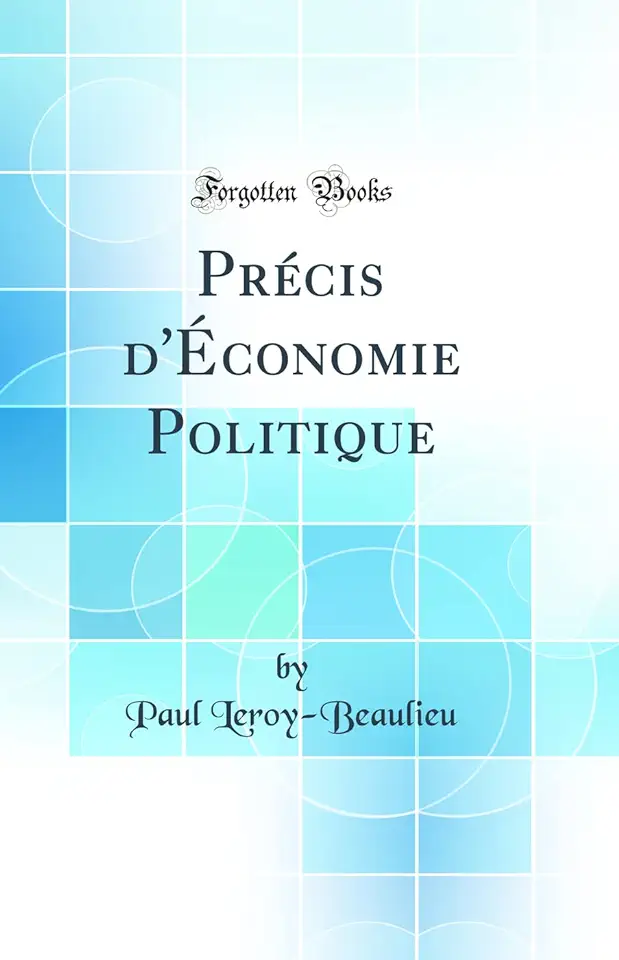
Precis of Political Economy - Paul Leroy-Beaulieu
Precis of Political Economy
By Paul Leroy-Beaulieu
Introduction
In his seminal work, "Precis of Political Economy," Paul Leroy-Beaulieu presents a comprehensive and insightful analysis of the fundamental principles and concepts that govern the economic sphere. With a blend of theoretical rigor and practical relevance, Leroy-Beaulieu offers a profound understanding of the intricate workings of economies, encompassing production, distribution, exchange, and consumption.
The Scope of Political Economy
Leroy-Beaulieu begins by establishing the scope and boundaries of political economy, distinguishing it from related fields such as ethics, politics, and law. He emphasizes the importance of understanding economic phenomena within their social and institutional contexts, highlighting the interdependence between economic activities and broader societal structures.
Production and the Factors of Production
The author delves into the intricacies of production, the process by which goods and services are created. He identifies and analyzes the three fundamental factors of production: land, labor, and capital. Leroy-Beaulieu explores the role of each factor in the production process, their respective contributions to economic output, and the dynamics of their interactions.
Value and Price
Leroy-Beaulieu tackles the complex concepts of value and price, shedding light on the mechanisms that determine the exchange value of goods and services. He examines the subjective theory of value, emphasizing the role of individual preferences and utility in shaping economic choices. The author also discusses the influence of supply and demand on price formation, demonstrating how market forces interact to establish equilibrium prices.
Distribution of Wealth
A central theme in Leroy-Beaulieu's analysis is the distribution of wealth within society. He explores the various theories of distribution, including the classical theory of rent, the wages fund theory, and the marginal productivity theory. Leroy-Beaulieu critically assesses each theory, highlighting their strengths and limitations, and offers his own insights into the factors that shape income distribution.
Money and Banking
The author dedicates a substantial portion of his work to the role of money and banking in the economy. He explains the functions of money as a medium of exchange, a store of value, and a unit of account. Leroy-Beaulieu also examines the operations of banking systems, the creation of credit, and the impact of monetary policy on economic activity.
International Trade
Leroy-Beaulieu explores the realm of international trade, analyzing the benefits of specialization and comparative advantage. He discusses the various trade theories, including the classical theory of comparative advantage and the modern theory of international trade. The author emphasizes the importance of free trade in promoting economic growth and prosperity, while acknowledging the potential challenges and complexities associated with international trade.
Government and the Economy
Leroy-Beaulieu examines the role of government in the economy, focusing on the areas of public finance, taxation, and public goods provision. He analyzes the impact of government policies on economic outcomes, including the effects of taxation on economic incentives, the role of public investment in infrastructure, and the potential for government intervention to address market failures.
Economic Growth and Development
In the final section of his book, Leroy-Beaulieu explores the dynamics of economic growth and development. He discusses the factors that contribute to sustained economic growth, such as technological progress, capital accumulation, and human capital formation. Leroy-Beaulieu also examines the challenges and obstacles to economic development, particularly in the context of developing countries.
Conclusion
"Precis of Political Economy" by Paul Leroy-Beaulieu stands as a timeless and influential contribution to the field of economics. With its comprehensive coverage of fundamental economic principles, insightful analysis, and practical relevance, this book remains an essential resource for students, scholars, and policymakers alike. Leroy-Beaulieu's work provides a profound understanding of the complex interactions that shape economic systems, offering valuable insights into the challenges and opportunities of the modern economy.
Enjoyed the summary? Discover all the details and take your reading to the next level — [click here to view the book on Amazon!]